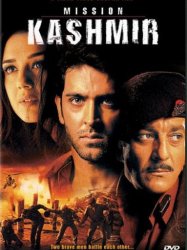Films with theme "Films about Islam", sorted by revenue

Saint Mary (2001)
, 1h54Directed by Shahriar Bahrani
Origin Iran
Genres Drama, Historical
Themes Films about religion, Films about sexuality, Documentary films about religion, Films based on the Bible, Films about Islam, Portrayals of Jesus in film, Films about virginity
Actors Shabnam Gholikhani, Hossein Yari, Mohammad Poursattar, Hossein Panahi
In the year 16 BCE, the people of Jerusalem are awaiting the birth of the son of Imran. Instead of the much-anticipated "Messiah", a girl is born to Imran and Anna. The latter names her Mary, which means "Servant of God". At the age of six, Mary is presented at the Temple, and remains there under the protection of the priest Zechariah until she turns sixteen.

Mission Kashmir (2000)
, 2h30Directed by Vidhu Vinod Chopra
Origin Inde
Genres Drama, Thriller, Action
Themes Films about music and musicians, Films about religion, Films about terrorism, Musical films, Films about Islam, Bollywood
Actors Sanjay Dutt, Hrithik Roshan, Preity Zinta, Sonali Kulkarni, Jackie Shroff, Neha
Inayat Khan (Sanjay Dutt) is the Senior Superintendent of Police responsible for the security of Srinagar, Kashmir. One day, his young son Irfaan (Yogin Soni) meets with an accident and is taken to a hospital. Unfortunately, due to a fatwa instigated by the leader of a terrorist group forbidding doctors to treat policemen, the doctors refuse to treat Irfaan. Khan angrily threatens to kill the doctors if they don't treat his son, but they still refuse, saying they are willing to die rather than letting their families be killed by the terrorist group. As a result, Irfaan dies, and Khan personally swears to put an end to the threat of the terrorist group. After finding out that the group of terrorists is taking refuge in the village of Dalgate, Khan and his men manage to attack and kill the criminals. Unfortunately, a family is caught in the crossfire, and they are killed as well. A young boy named Altaaf is the only family member who survives the shooting. He is severely traumatized by seeing his parents and sister dying in front of his eyes and is haunted by the memory of the masked policeman who shot at his family: that police officer is Khan. Altaaf falls unconscious and is jailed by Khan's men, much to Khan's anger, who then berates his officers for placing Altaaf in jail. Khan's wife Neelima (Sonali Kulkarni), having just lost Irfaan and feeling sorry for Altaaf, attempts to persuade Khan to let them adopt the boy. Khan, despite his fear that Altaaf may one day discover the truth and get revenge for it, reluctantly agrees, feeling extremely remorseful for killing Altaaf's family.

The Clay Bird (2002)
, 1h34Directed by Tareque Masud
Origin France
Genres Drama
Themes L'adolescence, Films about education, Films about children, Films about religion, Films about Islam, Films about school violence
Actors Jayanta Chattopadhyay, Rokeya Prachy
The film is set against the backdrop of unrest in East Pakistan in the late 1960s leading up to the Bangladesh War of Liberation. In this setting, a small family must come to grips with its culture, its faith, and the brutal political changes entering its small-town world. Anu, a young boy, is sent off to a madrasah by his unbendingly devout father Kazi. Anu's younger sister falls ill and dies because of Kazi's refusal to use conventional medicine. While at the madrasah, Anu befriends Rokon, an eccentric misfit in the rigorous religious school, who is forced by the teachers to undergo an exorcism by ducking in the freezing river to cure himself.

Silent Waters (2003)
, 1h39Directed by Sabiha Sumar
Origin Pakistan
Genres Drama, Musical
Themes Films about religion, Films about suicide, Films about Islam
Actors Kiron Kher, Shilpa Shukla, Aamir Ali Malik, Salman Shahid, Abid Ali
The story opens in 1979 in the village of Charkhi in the Punjab province of Pakistan. Ayesha is a middle-aged widow whose life is centred on her only son, the teenager Saleem, who is in love with Zubeida, a teenage village schoolgirl. Ayesha manages to support herself and her son with her late husband's pension and by giving lessons in the Qur'an to village girls. Generally well-liked and regarded, the only odd thing about Ayesha is that she refuses to go to the village well, having her neighbor's daughters draw water for her. Some villagers such as Amin, the postman, are troubled by the recent hanging of former prime minister Zulfikar Ali Bhutto by the new military ruler, General Zia-ul-Haq, who has promised to enforce Islamic law and encourages Islamic missionary and political groups to spread Islamism across Pakistan. Two activists from an Islamist group come to the village and, supported by the village "Choudhary" (landlord), start spreading their message of Islamic zealotry and gain recruits to fight the then-impending Soviet invasion of Afghanistan. The older men in the village react with disdain to their message of intolerance and puritanism, express cynicism at Zia's continual postponement of democratic elections and are angered when the activists accuse them of being un-Islamic and traitors. Although they struggle amongst the older village men, the activists soon gain a following amongst the village youth, including Saleem. With a mixture of cajoling and intimidation, the activists bring Saleem with them to a political meeting in Rawalpindi, where the speakers exhort their audience to commit themselves to jihad (religious war) for the creation of a true Islamic state in Pakistan. Drawn by their missionary zeal and call to serve Islam and Pakistan, Saleem, who wants to lead a more meaningful life than that of a simple village farmer, abandons Zubeida and grows estranged from his mother. Ayesha tries to discourage him from following the Islamists, but fails. Saleem participates in the construction of a wall to surround the girls school to "protect" them and enforcing a shutdown of village shops during namaaz (prayer) time, in line with Zia-ul-Haq's Islamisation. Both Ayesha and Zubeida are deeply alarmed at Saleem's transformation into an angry and hostile young man.

Twin Towers (2003)
, 34minutesDirected by Bill Guttentag
Origin USA
Genres Documentary
Themes Films based on the September 11 attacks, Films about religion, Films about terrorism, Transport films, Films about the labor movement, Aviation films, Documentary films about law, Documentary films about war, Documentary films about historical events, Documentary films about politics, Documentary films about religion, Documentary films about technology, Documentary films about terrorism, Political films, Films about Islam, Dans un avion, Disaster films, Films about aviation accidents or incidents, Films about hijackings
Actors Bill Guttentag
L'héroisme de deux frères, l'un pompier et l'autre policier, pendant les attentats du 11 septembre 2001 à New York.

911 in Plane Site (2004)
, 1h12Origin USA
Genres Documentary
Themes Films based on the September 11 attacks, Films about religion, Films about terrorism, Transport films, Aviation films, Documentary films about law, Documentary films about war, Documentary films about historical events, Documentary films about politics, Documentary films about religion, Documentary films about technology, Documentary films about terrorism, Political films, Films about Islam, Disaster films, Films about aviation accidents or incidents, Films about hijackings

Being Osama (2004)
Directed by Mahmoud Kaabour
Origin Canada
Genres Documentary
Themes Films based on the September 11 attacks, Films about racism, Films about religion, Films about terrorism, Transport films, Aviation films, Documentary films about racism, Documentary films about law, Documentary films about war, Documentary films about historical events, Documentaire sur une personnalité, Documentary films about politics, Documentary films about religion, Documentary films about technology, Documentary films about terrorism, Documentary films about cities, Political films, Films about Islam, Disaster films, Films about aviation accidents or incidents, Films about language and translation, Films about hijackings
The documentary details the lives of six Montreal Arab men, all with the first name "Osama":
 , 1h2
, 1h2Directed by Gregory Allyn Palast
Origin USA
Genres Biography, Documentary
Themes Films based on the September 11 attacks, Films about religion, Films about terrorism, Transport films, Aviation films, Documentary films about law, Documentary films about war, Documentary films about historical events, Documentaire sur une personnalité, Documentary films about politics, Documentary films about religion, Documentary films about technology, Documentary films about terrorism, Political films, Films about Islam, Disaster films, Films about aviation accidents or incidents, Films about hijackings
The film starts with a brief pre-title clip from presenter Greg Palast’s aborted interview with Florida Director of Elections Clayton Roberts, who walks out.

Fahrenhype 9/11 (2004)
, 1h20Origin USA
Genres Documentary
Themes Films based on the September 11 attacks, Films about religion, Films about terrorism, Transport films, Aviation films, Documentary films about law, Documentary films about war, Documentary films about historical events, Documentary films about politics, Documentary films about religion, Documentary films about technology, Documentary films about terrorism, Political films, Films about Islam, Dans un avion, Disaster films, Films about aviation accidents or incidents, Films about hijackings
Actors Ron Silver, Michael Moore

The Great Journey (2004)
, 1h48Directed by Ismaël Ferroukhi
Origin France
Genres Drama, Comedy, Romance
Themes Films about religion, Transport films, Films about automobiles, Films about Islam, Road movies
Actors Nicolas Cazalé, Mohammed Majd, Jacky Nercessian, Kamel Belghazi, Roxane Mesquida
Réda (Nicolas Cazalé) is a French-Moroccan teenager due to sit for Baccalauréat. When his devout father (played by Mohamed Majd) asks Réda to accompany him on a pilgrimage to Mecca, he reluctantly agrees. However, the father insists that they travel by car. As both embark on a road trip thousands of kilometres away from southern France, the once-icy father-and-son relationship starts to thaw as both gradually come to know each other. Réda speaks only in French to his father, who is seen speaking only Arabic for the majority of the film. Later, when necessary, the father proves that he in fact speaks impeccable French; his choice to speak only Arabic to his son is therefore purposeful.
 , 1h27
, 1h27Origin USA
Genres Documentary
Themes Films based on the September 11 attacks, Films about religion, Films about terrorism, Transport films, Aviation films, Documentary films about law, Documentary films about war, Documentary films about historical events, Documentary films about politics, Documentary films about religion, Documentary films about technology, Documentary films about terrorism, Documentary films about cities, Political films, Films about Islam, Disaster films, Films about aviation accidents or incidents, Films about hijackings
Actors Kathleen Turner

Unveiled (2005)
, 1h37Directed by Angelina Maccarone
Origin German
Genres Drama, Romance
Themes Films about religion, Films about sexuality, LGBT-related films, Films about Islam, LGBT-related films, LGBT-related films about religion, LGBT-related film, Lesbian-related films
Actors Navíd Akhavan, Jasmin Tabatabai, Anneke Kim Sarnau, Georg Friedrich, Monika Hansen, Hinnerk Schönemann
The translator Fariba Tabrizi (29, played by Jasmin Tabatabai) is living under the threat of the death penalty in her own country Iran after being revealed, by the vice squad, to be homosexual. With some support from a relative, Fariba is able to flee from her home country to Germany. When she is in the refugee detention centre at Frankfurt Airport her application for asylum is turned down. She lives hour by hour with the thought in mind that she may be deported. Her desperate prospects are dramatically improved by the suicide of a fellow-inmate also from Iran she assumes his identity and, as Siamak Mustafai, and using his temporary permit of sojourn, is re-located to the provinces of Swabia.

The Giant Buddhas (2006)
, 1h35Directed by Christian Frei
Genres Documentary
Themes Films about religion, Films about terrorism, Documentary films about law, Documentary films about war, Documentary films about historical events, Documentary films about politics, Documentary films about religion, Documentary films about terrorism, Political films, Films about Buddhism, Films about Islam
Actors Peter Mettler
 , 58minutes
, 58minutesOrigin Pakistan
Genres Documentary
Themes Films based on the September 11 attacks, Films about religion, Films about terrorism, Transport films, Aviation films, Documentary films about law, Documentary films about war, Documentary films about historical events, Documentary films about politics, Documentary films about religion, Documentary films about technology, Documentary films about terrorism, Political films, Films about Islam, Disaster films, Films about aviation accidents or incidents, Films about hijackings
The film follows with the journey of the Pakistani rock star Salman Ahmad, a US citizen of Pakistani origin, asks fellow Muslims what it’s like to be Muslim in post-9/11 America.

Native New Yorker (2005)
, 13minutesOrigin USA
Genres Documentary
Themes Films based on the September 11 attacks, Environmental films, Films about religion, Films about terrorism, Transport films, Aviation films, Documentary films about law, Documentary films about war, Documentary films about historical events, Documentary films about politics, Documentary films about religion, Documentary films about technology, Documentary films about terrorism, Documentary films about cities, Political films, Films about Islam, Disaster films, Films about aviation accidents or incidents, Films about hijackings
 Connection
Connection